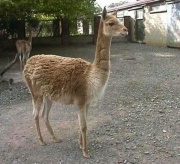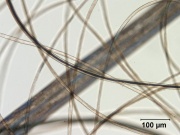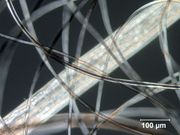Difference between revisions of "Vicuna"
| (4 intermediate revisions by the same user not shown) | |||
| Line 1: | Line 1: | ||
[[File:vicunawp2.jpg|thumb|Vicuna ''Vicugna vicugna'']] | [[File:vicunawp2.jpg|thumb|Vicuna ''Vicugna vicugna'']] | ||
== Description == | == Description == | ||
| − | [[File:29_Vicuna_200X adj.jpg|thumb|Vicua hair fibers]] | + | [[File:29_Vicuna_200X adj.jpg|thumb|Vicua hair fibers at 200x]] |
The vicuña (''Vicugna vicugna'', formerly ''Lama vicugna'') is a small, wild camelid, closely related to alpacas, llamas, and guanacos. It is found mainly at high altitudes (10,500 to 17,000 feet) in Peru, Bolivia, northern Chile, and Northwestern Argentina. The vicuna produces a fine, downy fleece that is valuable. The straight, silk-like [[wool|wool]] is very rare. It is generally left undyed in its natural white or cream color due to its sensitivity to chemical treatment. Vicuñas have some of the finest fibers in the world, at a diameter of 12 μm. The fiber of cashmere goats is 14 to 19 μm, while angora rabbit is 8 to 12 μm and that of shahtoosh from the Tibetan antelope, or chiru, is from 9 to 12 μm.[9] Since it is sensitive to chemical treatment, the wool is usually left in its natural color. In Peru, individual animals can only be shorn alive, once every three years. Vicuña is used for coats, suits, and soft shawls. | The vicuña (''Vicugna vicugna'', formerly ''Lama vicugna'') is a small, wild camelid, closely related to alpacas, llamas, and guanacos. It is found mainly at high altitudes (10,500 to 17,000 feet) in Peru, Bolivia, northern Chile, and Northwestern Argentina. The vicuna produces a fine, downy fleece that is valuable. The straight, silk-like [[wool|wool]] is very rare. It is generally left undyed in its natural white or cream color due to its sensitivity to chemical treatment. Vicuñas have some of the finest fibers in the world, at a diameter of 12 μm. The fiber of cashmere goats is 14 to 19 μm, while angora rabbit is 8 to 12 μm and that of shahtoosh from the Tibetan antelope, or chiru, is from 9 to 12 μm.[9] Since it is sensitive to chemical treatment, the wool is usually left in its natural color. In Peru, individual animals can only be shorn alive, once every three years. Vicuña is used for coats, suits, and soft shawls. | ||
== Synonyms and Related Terms == | == Synonyms and Related Terms == | ||
| − | + | vicua; vicuña; ''Vicugna vicugna''; ''Lama vicugna''; vigogne (Fr.); vicua (Esp.) | |
| + | |||
| + | [[File:29_Vicuna_200X_pol adj.jpg|thumb|Vicua hair fibers at 200x polarized light]] | ||
| + | [[File:29_Vicuna_500X_pol adj.jpg|thumb|Vicua hair fibers at 500x polarized light]] | ||
| − | |||
| − | |||
== Physical and Chemical Properties == | == Physical and Chemical Properties == | ||
| − | Fiber length = 5 cm | + | * Fiber length = 5 cm |
| + | * Fiber diameter = 6-10 mm | ||
== Comparisons == | == Comparisons == | ||
Latest revision as of 12:44, 28 September 2022
Description
The vicuña (Vicugna vicugna, formerly Lama vicugna) is a small, wild camelid, closely related to alpacas, llamas, and guanacos. It is found mainly at high altitudes (10,500 to 17,000 feet) in Peru, Bolivia, northern Chile, and Northwestern Argentina. The vicuna produces a fine, downy fleece that is valuable. The straight, silk-like Wool is very rare. It is generally left undyed in its natural white or cream color due to its sensitivity to chemical treatment. Vicuñas have some of the finest fibers in the world, at a diameter of 12 μm. The fiber of cashmere goats is 14 to 19 μm, while angora rabbit is 8 to 12 μm and that of shahtoosh from the Tibetan antelope, or chiru, is from 9 to 12 μm.[9] Since it is sensitive to chemical treatment, the wool is usually left in its natural color. In Peru, individual animals can only be shorn alive, once every three years. Vicuña is used for coats, suits, and soft shawls.
Synonyms and Related Terms
vicua; vicuña; Vicugna vicugna; Lama vicugna; vigogne (Fr.); vicua (Esp.)
Physical and Chemical Properties
- Fiber length = 5 cm
- Fiber diameter = 6-10 mm
Comparisons
Resources and Citations
- Marjory L. Joseph, Introductory Textile Science, Holt, Rinehart and Winston, Fort Worth, TX, 1986
- J.Gordon Cook, Handbook of Textile Fibres:I Natural Fibres, Merrow Publishing Co. , Durham, England, 1984
- Encyclopedia Britannica, http://www.britannica.com Comment: vicua." accessed 16 Dec. 2004 and June 8, 2019.
- Edward Reich, Carlton J. Siegler, Consumer Goods: How to Know and Use Them, American Book Company, New York City, 1937
- Rosalie Rosso King, Textile Identification, Conservation, and Preservation, Noyes Publications, Park Ridge, NJ, 1985
- Random House, Webster's Encyclopedic Unabridged Dictionary of the English Language, Grammercy Book, New York, 1997
- The American Heritage Dictionary or Encarta, via Microsoft Bookshelf 98, Microsoft Corp., 1998
- Animal Fiber, https://en.wikipedia.org/wiki/Animal_fiber", accessed June 8, 2019



